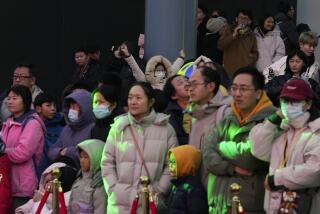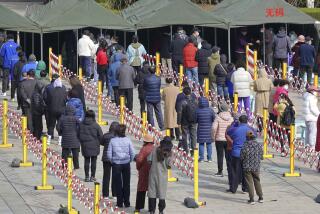China Admits AIDS Rising Rapidly
- Share via
BEIJING — In a rare public admission, a senior health official acknowledged Thursday that an AIDS epidemic is spreading rapidly in China, not only through drug use and unsafe sex but also through the common practice of villagers selling their blood.
Yin Dakui, a deputy health minister, said new reports of HIV infections surged 67% in the first half of this year compared with the same period last year.
Overall, 600,000 people in China have HIV or AIDS, according to official data--although international experts say the real figure could easily be twice that.
“Like many other countries,” China is now faced with “a very serious epidemic of HIV-AIDS,” Yin told reporters. “In some particular regions, some leaders and the general public have not fully realized the hidden dangers of a full-scale epidemic of HIV-AIDS.”
The statement was the Chinese government’s first official admission of a burgeoning AIDS crisis in one particular area of China, Henan province, a few hundred miles south of Beijing.
Despite efforts by local authorities to keep a lid on information, reports by Chinese and foreign media over the last year have uncovered villages in Henan where residents have been decimated by AIDS, with an estimated infection rate as high as 65% in one village. Doctors working there have described the area as a “combat zone.”
The disease was spread by poor farmers who found a quick way of making extra money in the late 1980s and early ‘90s by selling their blood, often to local health authorities and at government-sponsored donation stations.
For the first time, Yin conceded that the practice was responsible for many of the official reported cases--between 30,000 and 50,000--of AIDS and HIV, the human immunodeficiency virus that causes the disease. Some experts, he acknowledged, estimate that the number is closer to 100,000--or one of every six documented cases nationwide.
“People saw this as a way to improve their lives [and] raise their living standards,” Yin said of the blood sales.
However, he angrily denied that the central government was to blame for the AIDS outbreak--or for subsequent efforts to cover it up. Local officials, he charged, had neglected to follow proper health procedures.
Reporters trying to travel to the affected areas have routinely been blocked, detained and then sent back by police. Local advocates, including one doctor internationally recognized for her work with Henan’s AIDS patients, have been muzzled.
Three months ago, a group of infected residents from Wenlou, a hard-hit village, traveled to Beijing in a daring attempt to meet with foreign reporters to draw attention to their plight, accusing the government of doing little to help them.
Yin disclosed Thursday that in Wenlou alone, 43% of residents who sold blood have become infected with HIV.
He said Beijing will spend more than $100 million to improve blood-collecting procedures. Most of the blood donors in Henan contracted HIV not from dirty needles but from the common practice of pumping pooled blood back into donors’ bodies after the valuable plasma was extracted--a practice that allowed the blood of one infected person to infect dozens of others at once.
Nationwide, the government reported 3,541 new HIV cases in the first six months of this year--up by two-thirds from the 2,115 cases reported during the same period last year.
Officials say intravenous drug use accounts for the majority of infections, and sexual contact for a relatively small proportion.
Both drug use and unsafe sex, particularly in China’s booming prostitution industry, are on the rise, especially in southern China.
More than a third of drug users share needles, the Health Ministry reported Thursday, and 5% of all drug users in China are HIV-positive, up from .04% just six years ago.
Among sex workers, 1.3% who were tested were found to have HIV. Less than 10% of prostitutes surveyed said they regularly make their clients wear condoms.
The increasing rates of HIV infection reflect the fact that AIDS education and awareness remain woefully lacking in China. Sex remains a taboo topic. In a poll last year, less than 4% of respondents were able to identify correctly how HIV is transmitted. Nearly half those asked did not think condoms helped prevent infection, and as many believed that the virus could be spread by a sneeze or on utensils used by an infected person.
In the Chinese countryside, home to 800 million peasant farmers, knowledge of AIDS is low to nonexistent.
The meager, ill-funded attempts by the government to promote AIDS education rarely reach China’s interior, leading to widespread ignorance.
That is what caused many residents of Henan, China’s most populous province, to engage in unsanitary blood selling, unaware of the potential consequences.
For many farmers, the prospect of earning $5 per donation was a bonanza too good to pass up. The money paid for new homes and school fees.
The problem was compounded by the complicity of local health officials, many of whom helped run blood-collecting stations.
Such state-approved stations proliferated throughout the province in the 1980s, as did illegal set-ups by middlemen, known as “blood heads,” who bought blood and then resold it to institutional buyers.
By the middle of the last decade, the provincial government outlawed blood stations as reports of AIDS infection began to surface.
But for tens of thousands of residents, the damage was already done.
More to Read
Sign up for Essential California
The most important California stories and recommendations in your inbox every morning.
You may occasionally receive promotional content from the Los Angeles Times.











